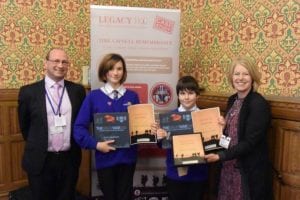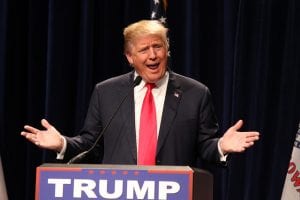Legacy 110 awards ceremony blog
By utnvlru, on 11 December 2016
The Legacy 110 programme is an initiative built around the UCL Institute of Education (IOE)’s First World War Centenary Battlefields Tour Programme, which aims to encourage pupils and schools that take part in the tours to share what they have learned with others in their schools and communities in order to help maintain the legacy of the Great War.

This comprehensive education programme, which allows every secondary school in England to send two pupils and one teacher to the Ypres and the Somme to witness first-hand battlefields sites, is now half way through its scheduled five years. The second annual awards ceremony, recognising some of the most outstanding projects that have taken place as part of Legacy 110, was held at the House of Lords on Thursday 8th December – featuring presentations from each of the winning schools.
The diverse and impressive range of projects that received awards showcased how the programme is about much more than simply learning about WW1 or history, and that it actually cuts across subject areas – from English, drama, music through to art, and helps encourage children to work with different groups of people.
As the programme leader, Jerome Freeman from the IOE said in his address: “this is much more than just a battlefield tour – it is a comprehensive educational programme. It goes well beyond the 1 Plus 2 on the tour – it impacts hundreds of students in every school”. He added that the Legacy projects encourage children to work with many different groups – “their communities, other schools, different generations” and encourages them to “build connections across these”.
Launching a citizen science paper at the League of European Research Universities
By ucyow3c, on 7 December 2016
Written by Alice Sheppard – Community Manager, UCL ExCiteS
A little over a year ago, many academics and I – not, then, an academic, but a long-time citizen science volunteer – gathered in Zurich for a day of presentations and panels to discuss the idea of creating a set of standards and recommendations for citizen science across and beyond Europe.
Should citizen science have policies and guidelines, or would this be too prescriptive or restrictive? What would ensure that everyone, and science itself, benefitted?
The conference organisers spent the next several months writing a paper of guidelines for researchers and policies for universities wishing to engage in citizen science, which they launched this year’s event in Brussels. I have since started working at UCL, and I was asked to introduce citizen science as a concept, from the perspective of both a volunteer and an academic.
Katrien Maes and Daniel Wyler presented the paper, ‘Citizen science at universities’. Citizen science, an activity where a person not in an academic institution contributes their time to scientific activities, is not new.
Renaissance science was mostly practised by wealthy “gentlemen scientists” (whose wives and other nearby women were often unacknowledged contributors!), and Charles Darwin corresponded with thousands of citizens who recorded aspects of nature around them.

But in the digital age citizen science is undergoing a revival. There is huge new potential for communication between scientists and the public and for data collection and analysis.
Therefore, the paper states, it is important to do three things: citizen science practitioners should collaborate and share best practices; we should create platforms that support a wide variety of citizen science projects, so as to create more public awareness and increase opportunities; and we should not treat citizen scientists simply as agents to get the simple but lengthy tasks done, but to involve them at all stages of the research process, from beginnings to publication.
I was pleased to see advice to use open science and to plan properly for substantial community management. This means not treating citizen scientists as colleagues, taking into account adequate communication with them, tracking not only what they are doing but also their diversity and numbers, and of course properly acknowledging their work.
Collective practices vs. the Neoliberal City?
By ucyow3c, on 29 November 2016
Written by Harshavardhan R Jatkar, UCL Bartlett Development Planning Unit
Has democracy failed to resist the neoliberal vision of the city and does architecture have anything to contribute to the debate? A presentation by Leonardo Cappetto, an architect and co-founder of Grupo TOMA, came as a fresh and potent ray of hope on Thursday evening – 17th November 2016. Thanks to Dr. Camilo Boano, Leonardo was invited to present at the Development Planning Unit.
His presentation commenced by juxtaposing the rise of populist right-wing politicians almost all around the world and the seeming demise of an alternative to the neoliberal city. But the optimism rose as he presented the work done by the Chile based collective – Grupo TOMA towards attempting to find that alternative.

The promise of an alternative reflected within the very structure of Grupo TOMA, defying the norms that governed the 20th century professional world.
Grupo TOMA is a collective of architects without any hierarchical internal relationships.
It is a nomad organisation that resents the idea of growth for its sake and it works with temporal communities inherently being denied the chance for any permanent architectural statement.
What motivates a group of architects to let go of the egotistic practice of the 20th century?
What inspires their continuing reconciliation with temporal existence?
Leonardo’s presentation was just a glimpse into some of the aspects that may answer these questions. Read the rest of this entry »
The 2016 US presidential election: a post-mortem
By Melissa Bradshaw, on 23 November 2016
Dr Nick Witham began by admitting that he’d had to rewrite this Lunch Hour Lecture because, like all the pollsters, he had expected a different outcome from the US presidential election. Nonetheless, and unsurprisingly given Dr Witham’s expertise, it was a thorough post-mortem with important conclusions.
Although the electoral map of the US, as Dr Witham showed us, is now heavily dominated by Republican red, for only the fifth time in US history the President-elect lost the popular vote. Hillary Clinton has won more than 1.5 million more votes than Donald Trump, he said, and this margin could increase to 2 million.*
As well as the distorting effects of the Electoral College, Donald Trump’s victory “forces us to reckon with some very unpleasant features of the US political landscape,” Dr Witham said.
Trump’s appeal to ethno-nationalism, racism, and misogyny
He began by analysing the appeal of Trump’s campaign. His slogan, “Make America great again”, resonated with a large portion of the American population who felt unrepresented by globalisation, multiculturalism and political correctness: in particular in America’s Rust Belt, which has experienced stagnating wages and living standards.
“Make America great again” was also an etho-nationalist appeal to the memory of white privilege.

In many of the most memorable moments of his campaign – smearing immigrants, promising to build a “glorious” wall to keep out Mexicans, promising a ban on Muslims entering the US, and a public fight with the parents of a Pakistani-American US Army captain killed in Iraq – Trump “politicised immigration more successfully than any Republican candidate before him,” said Dr Witham. (Image: Evan Guest)
Trump also appealed to old-fashioned American racism, Dr Witham said, and he warned that Trump’s endorsement by white supremacists such as David Duke, former Imperial Wizard of the Ku Klux Klan, means that these people will now take a place at the forefront of American political life.
Finally Trump’s misogyny, culminating in a number of sexual assault allegations against him, and his behaviour towards Clinton in the televised debates, which was “dripping with condescension and privilege” only added to Trump’s status as a maverick outsider who “tells it like it is”. (T shirts worn at Trump rallies included “Hillary sucks but not like Monica” and “Trump that Bitch”.)
Unlike “shy Brexit” voters in the UK, Trump’s supporters did not quietly or shyly support him, but loudly and proudly.
 Close
Close

